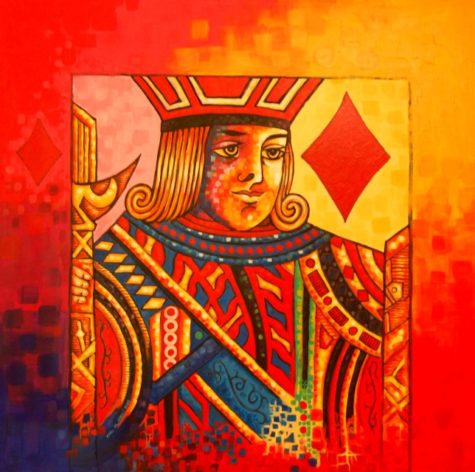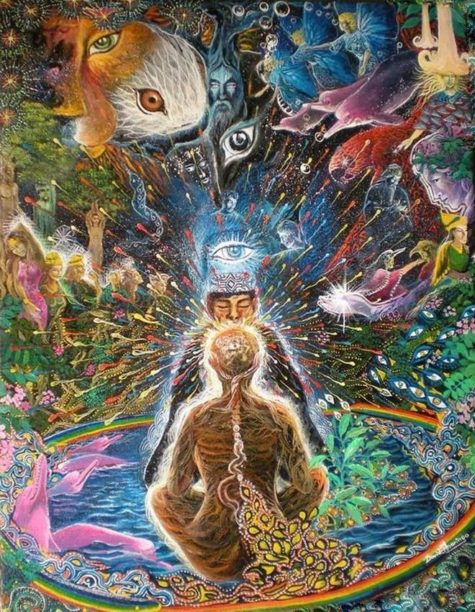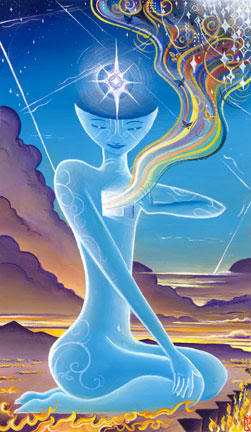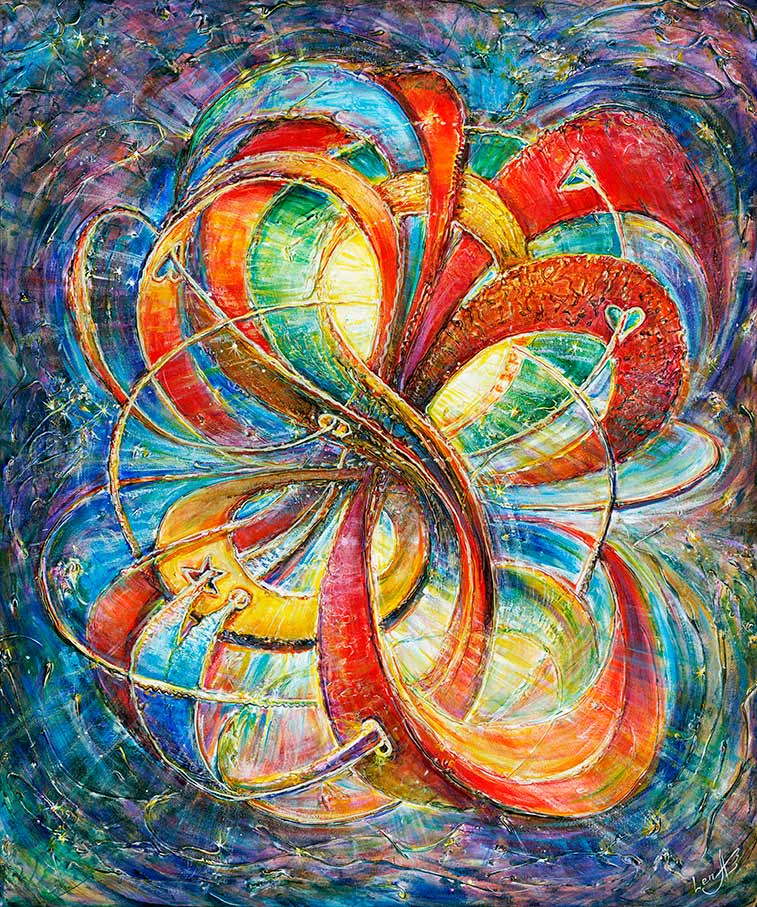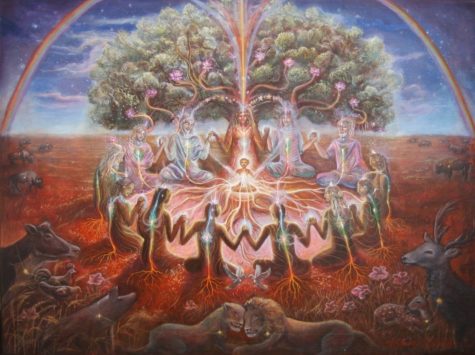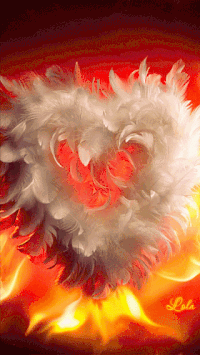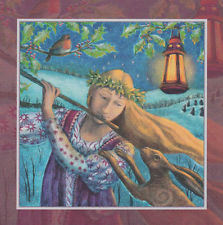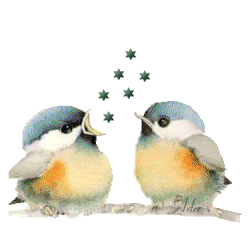God
Playing Cards
A Hasid complained to Rabbi Wolf that certain persons were turning night into day, playing cards. “That is good,” said the zaddik. “Like all people they want to serve God and don’t know how. But now they are learning to stay awake and persist in doing something. When they have become perfect in this, all they need to do is turn to God – and what excellent servants they will make for him then.!”
~Chassid
Put This Design In Your Carpet
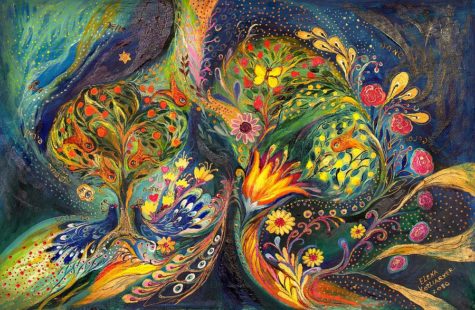
Spiritual experience is a modest woman
who looks lovingly at only one man.
It's a great river where ducks
live happily, and crows drown.
The visible bowl of form contains food
that is both nourishing and a source of heartburn.
There is an unseen presence we honor
that gives the gifts.
You're water. We're the millstone.
You're wind. We're dust blown up into shapes.
You're spirit. We're the opening and closing
of our hands. You're the clarity.
We're this language that tries to say it.
You're joy. We're all the different kinds of laughing.
Any movement or sound is a profession of faith,
as the millstone grinding is explaining how it believes
in the river! No metaphor can say this,
but I can't stop pointing
to the beauty.
Every moment and place says,
"Put this design in your carpet!"
Like the shepherd in Book II,
who wanted to pick the lice off God's robe,
and stitch up God's shoes, I want to be
in such a passionate adoration
that my tent gets pitched against the sky!
Let the beloved come
and sit like a guard dog
in front of the tent.
When the ocean surges,
don't let me just hear it.
Let it splash inside my chest!
~Rumi
What Should We Do About That Moon?
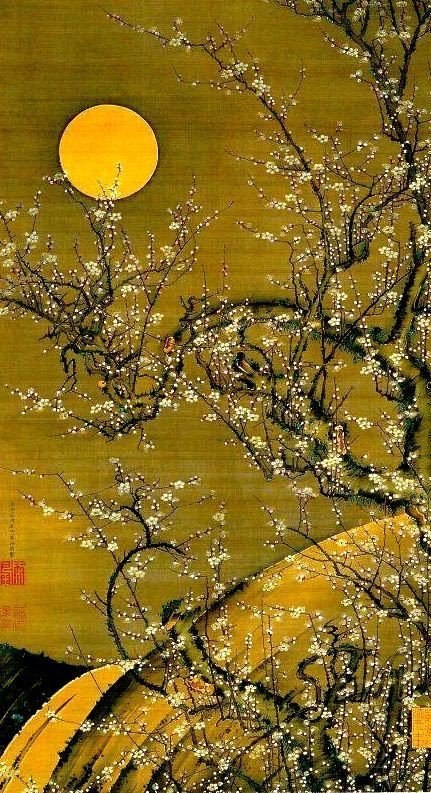
A wine bottle fell from a wagon
And broke open in a field.
That night hundred beetles and all their cousins
Gathered
And did some serious binge drinking.
They even found some seed husks nearby
And began to play them like drums and whirl.
This made God very happy.
Then the 'night candle' rose into the sky
And one drunk creature, laying down his instrument
Said to his friend - for no apparent
Reason,
"What should we do about that moon?"
Seems to Hafiz
Most everyone has laid aside the music
Tackling such profoundly useless
Questions.
From: ‘The Gift – Poems by Hafiz the Great Sufi Master’
translations by Daniel Ladinsky
The Symbols of Rumi
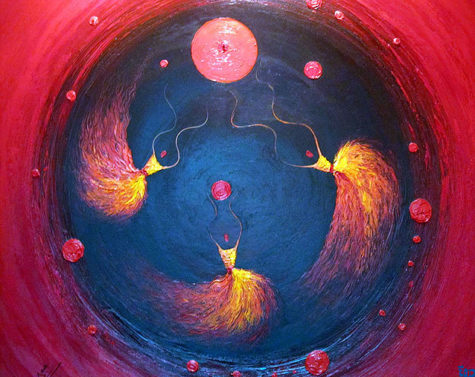
German philosopher and theologist, Rudolph Otto draws an allusion between God and a mighty mountain, the summit of which is invisible in eternal darkness. According to him, a very small part of this mountain is visible, and this appears as a promontory of good hope. We see this minute promontory, through the haze and the smoke of this world and consider it as the final.
Whenever we observe a Providential manifestation, we endeavour to commit it to memory by words or allegories. However, every word we find or every symbol we use to commit the manifestation is in one sense untrue. Therefore, and in accordance with all religions, the proper description of the Divine Secret is silence.
It is not possible to describe the secret of the Divine Being which is entirely different from all creation. The human being who discovers this secret and the final truth must not reveal it.
As Jalaluddin Rumi asserted and reasserted, it is impossible to get near the sun. The light and fire of the sun will destroy instantly anyone who attempts to observe it without the veil.
For these two reasons, the mystics who experience this observation in ecstasy use symbols for its description. They do this either to show an image of the final truth or to veil the merciless fire of this truth with a colored curtain.
The works of Jalaluddin Rumi are, therefore, saturated with such symbols. There is no other mystic poet either in the East or in the West to equal Rumi in the usage of such rich and resplendent symbols.
The most important symbol Rumi used was the sun. This is not extraordinary because his first and original beloved teacher was Shams al-Din. He saw the reflections and the rays of the Eternal Sun, the face of the Beloved, everywhere. In the absence of this sun, no roses will grow and no fruits ripen. The sun crowns the thorns of the bush with roses and turns the rough stones into red ruby through a process which lasts centuries. In similar manner, the Divine Beloved gives new life and eternal beauty to all lovers who love, suffer and wait longingly. But no one can enter this sun because His glorious magnificence burns all. The sun is an appropriate symbol to allude to the beauty and the majesty of God.
However, one single symbol, no matter how deep and meaningful it may be, cannot be sufficient for the comprehension of the diverse aspects of the Divine Reality. Rumi always searched for and found his symbols in nature. Orchards and gardens, birds and flowers, told the story of the lover and the beloved. The spirit was symbolised by a bird, which symbol was used from the time of the ancient Egyptians to the present day. The allegory of the rose and the nightingale, the duck which escapes into the sea, all allude to the central fact that the spirit desires to return to its original domain.
The smallest thing, whether it be a butterfly or a drop of water, in the hands of Rumi gains transparency and reveals the light of the Divine Secret. Man must become lost within the immense ocean of God like a drop of water, because man is like a small wave or fleck of foam created on that ocean. The fortunes afforded by God ebb and flow on that ocean and meet the shores of human life. But according to the wise, the occurrences which take place in our time and space are nothing but the reflections of the tides of fortune and misfortune which occur on that ocean which exists outside the realms of time and space. Whoever meets dissolution on that ocean immediately turns into the mother-of-pearl creating ocean. An absolute abandonment must create an absolute gain.
One of the characteristics of Rumi is that the symbols he used had not only one meaning, but were full of different meanings. These symbols can be taken as having a positive or a negative meaning. The fire, for instance, could be taken to mean the fire of hell, which can be extinguished either by the water of mercy or by the light of magnanimity; or it could also be taken to mean the fire of misfortunes which are made to purify the hearts. Where misfortune is used as a symbol of Divine love, it must mean the Fire of Love.
In all religions, there are certain symbols to allude to the religious truths and to the relationship of God and His creatures. Most of these symbols allude to the ancient rites and primitive customs. One of the most celebrated examples of these symbols is wine. Rumi draws a comparison between the indescribable intoxication caused by ecstasy and the intoxication caused by wine.
In eternity, in (Ruzi-i alast) God, in the shape of a cup-bearer, will hand the wine of love to the crying man away from home, longing for the scent of this cup, thereby indicating to His creatures his original domain or the way to his Beloved. This world is like an empty cup; when the lover sees the cup he becomes intoxicated. Because if the beauty of the cup-bearer becomes manifest and if there is a chance for the lover to drink the love from the lips of the beloved, the lover will perish by the majesty of the beloved. The cup-bearer is also a music-maker. He plays the flute, the lute and the lyre. The melodies produced on these instruments are always nostalgic. Man is like a lyre in the hands of his beloved, playing the tunes of torment; or man is like a lute in the lips of his beloved, inquiring the everlasting longing.
The flute, used as a symbol in many religions since ancient Babylonia, was a most favourite symbol with Rumi. According to him the roof and the doors of the house of love were made entirely of songs and poetry. The lover who can understand the voice of the flute responds to its tune and joins in the Sama and flies resplendent around the perpetual light of the Divine Beloved, like a planet or a star around the sun. In the Sama of Rumi and in all symbols relating to the Sama there is the deepest meaning.
Because the mystic lover eternally flies resplendent around one centre only; he wants to get near to one goal only and attempts to introduce his secret by using new symbols. The mystic lover finally understands the futility of his poetic endeavours and resumes silence and in silent gratitude flies resplendent around the beauty and majesty of God like an atom around the sun. He listens to His communication, and he gets completely dissolved into a state where there is no dhikr, no speaker and hearer. And the mystic lover flows into dissolution in the midst of all the symbols of different shades and colours and in the darkness of light.
Found at: The Institute of Ismaili Studies
In A Handful Of God
Poetry reveals that there is no empty space.
When your truth forsakes its shyness,
When your fears surrender to your strengths,
You will begin to experience
That all existence
Is a teeming sea of infinite life.
In a handful of ocean water
You could not count all the finely tuned
Musicians
Who are acting stoned
For very intelligent and sane reasons
And of course are becoming extremely sweet
And wild.
In a handful of the sky and earth,
In a handful of God,
We cannot count
All the ecstatic lovers who are dancing there
Behind the mysterious veil.
True art reveals there is no void
Or darkness.
There is no loneliness to the clear-eyed mystic
In this luminous, brimming
Playful world.
~Hafiz
Clouds of Love
the clouds of love have gathered,
raining over me,
my soul soaked within,
green woods around.
Says Kabir:
do not be proud,
seeing your mansion.
tomorrow you will lie beneath the earth,
tufts of grass over you.
Says Kabir:
those who do not love God
know no joy –
like a guest in an empty house,
they come and depart.
Your God dwells within you
like fragrance in the flower,
musk lies within the deer,
yet seeks it afar.
Worlds pass away reading scriptures,
none the wiser.
he who understands the word `Love’
is the wise one.
The Hindu says Ram is supreme
the Muslim, Rahim.
both die fighting each other,
neither knowing the Truth.
Remembering You ever
egoless, I have merged with You.
no more the cycle of births and deaths,
wherever the eye goes I see You.
Brimming with devotion to God I am.
this world tires me no more.
a pitcher once baked, says Kabir,
needs no potter’s wheel again.
– Kabir
Tired of Speaking Sweetly
Tired of Speaking Sweetly
Love wants to reach out and manhandle us,
Break all our teacup talk of God.
If you had the courage and
Could give the Beloved His choice, some nights,
He would just drag you around the room
By your hair,
Ripping from your grip all those toys in the world
That bring you no joy.
Love sometimes gets tired of speaking sweetly
And wants to rip to shreds
All your erroneous notions of truth
That make you fight within yourself, dear one,
And with others,
Causing the world to weep
On too many fine days.
God wants to manhandle us,
Lock us inside of a tiny room with Himself
And practice His dropkick.
The Beloved sometimes wants
To do us a great favor:
Hold us upside down
And shake all the nonsense out.
But when we hear
He is in such a “playful drunken mood”
Most everyone I know
Quickly packs their bags and hightails it
Out of town.
Rumi from ‘The Gift’
Translated by Daniel Ladinsky
The Seed of God
Marge and Tom Sexton: You Can’t Be Alive
JC: Joel Goldsmith On The Soul
Mayanna Anderson: The Sufi Greeting
Ena da Silva: The Sufi Greeting
Ena da Silva: The Sufi Greeting
